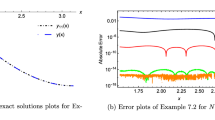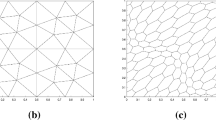Abstract
In this paper, we propose and analyze two standard finite difference schemes (called Scheme I and Scheme II) for discretizing the first-order necessary optimality systems, which characterize the optimal solutions of Dirichlet boundary control problems governed by elliptic equations. We proved that the proposed schemes are uniformly stable on a uniform mesh, which implies a second-order and first-order convergence of the Scheme I and Scheme II, respectively, provided the optimal solutions have the required regularity. The resulting symmetric indefinite sparse linear systems are solved by the preconditioned GMRES iterative solver with a fast (FFT-based) constraint preconditioner, which numerically shows a mesh-independent convergence rate. Numerical examples, including the case with less regular solutions, are presented to validate our theoretical analysis and demonstrate the promising approximation accuracy and computational efficiency of our proposed schemes and preconditioned iterative solver, respectively. Our developed fast finite difference schemes achieve a comparable order of convergence as the other available schemes in the literature.







Similar content being viewed by others
Notes
For our considered rectangle domain, the high regularity assumptions of y and z are rather restrictive, since both f and g are required to be sufficiently smooth and also satisfy suitable compatibility conditions at the four corners. With less regular solutions, we expect to obtain lower order of accuracy (see Example 3 in Sect. 4). Our current paper focuses on the case with smooth solutions, which serves as the first step toward more practical cases with nonsmooth solutions. It is likely to enforce only minimal regularity assumptions [5] by analyzing our proposed finite difference schemes within the framework of generalized (weak) solutions [25, Ch. 2], but how to obtain such (optimal) error estimates in various norms is still open for further study. The requirement of high regularity of solutions is an obvious drawback of any standard finite difference schemes. However, their simplicity and flexibility are very attractive to those applications in demand of efficient numerical implementation.
References
Jameson, A.: Aerodynamic design via control theory. J. Sci. Comput. 3(3), 233–260 (1988)
Gunzburger, M.D.: Perspectives in Flow Control and Optimization. SIAM, Philadelphia (2003)
John, C., Wachsmuth, D.: Optimal Dirichlet boundary control of stationary Navier–Stokes equations with state constraint. Numer. Funct. Anal. Optim. 30(11–12), 1309–1338 (2009)
Casas, E., Günther, A., Mateos, M.: A paradox in the approximation of Dirichlet control problems in curved domains. SIAM J. Control Optim. 49(5), 1998–2007 (2011)
Apel, T., Mateos, M., Pfefferer, J., Rösch, A.: On the regularity of the solutions of Dirichlet optimal control problems in polygonal domains. SIAM J. Control Optim. 53(6), 3620–3641 (2015)
Apel, T., Nicaise, S., Pfefferer, J.: Discretization of the poisson equation with non-smooth data and emphasis on non-convex domains. Numer. Methods Partial Differ. Equ. 32(5), 1433–1454 (2016)
Apel, T., Mateos, M., Pfefferer, J., Rösch, A.: Error estimates for Dirichlet control problems in polygonal domains: quasi-uniform meshes. Math. Control Relat. Fields 8(1), 217–245 (2018)
Casas, E., Raymond, J.-P.: Error estimates for the numerical approximation of Dirichlet boundary control for semilinear elliptic equations. SIAM J. Control Optim. 45(5), 1586–1611 (2006)
Vexler, B.: Finite element approximation of elliptic Dirichlet optimal control problems. Numer. Funct. Anal. Optim. 28(7–8), 957–973 (2007)
Deckelnick, K., Günther, A., Hinze, M.: Finite element approximation of Dirichlet boundary control for elliptic PDEs on two- and three-dimensional curved domains. SIAM J. Control Optim. 48(4), 2798–2819 (2009)
Gong, W., Yan, N.: Mixed finite element method for Dirichlet boundary control problem governed by elliptic PDEs. SIAM J. Control Optim. 49(3), 984–1014 (2011)
May, S., Rannacher, R., Vexler, B.: Error analysis for a finite element approximation of elliptic Dirichlet boundary control problems. SIAM J. Control Optim. 51(3), 2585–2611 (2013)
Of, G., Phan, T.X., Steinbach, O.: An energy space finite element approach for elliptic Dirichlet boundary control problems. Numerische Mathematik 129(4), 723–748 (2014)
Gong, W., Liu, W., Tan, Z., Yan, N.: A convergent adaptive finite element method for elliptic Dirichlet boundary control problems. IMA J. Numer. Anal. 22, 1–31 (2018). https://doi.org/10.1093/imanum/dry051
Mateos, M.: Optimization methods for Dirichlet control problems. Optimization 67(5), 585–617 (2018)
Karkulik, M.: A finite element method for elliptic Dirichlet boundary control problems. arXiv e-prints arXiv:1811.09251
Of, G., Phan, T.X., Steinbach, O.: Boundary element methods for Dirichlet boundary control problems. Math. Methods Appl. Sci. 33(18), 2187–2205 (2010)
John, L., Swierczynski, P., Wohlmuth, B.: Energy corrected FEM for optimal Dirichlet boundary control problems. Numerische Mathematik 139(4), 913–938 (2018)
Zuazua, E.: Propagation, observation, and control of waves approximated by finite difference methods. SIAM Rev. 47(2), 197–243 (2005)
Gerdts, M., Greif, G., Pesch, H.J.: Numerical optimal control of the wave equation: optimal boundary control of a string to rest in finite time. Math. Comput. Simul. 79(4), 1020–1032 (2008)
Ervedoza, S., Zuazua, E.: The wave equation: control and numerics. In: Cannarsa, P., Coron, J.M. (eds.) Control of Partial Differential Equations, pp. 245–339. Springer, Berlin (2012)
Gugat, M., Sokolowski, J.: A note on the approximation of Dirichlet boundary control problems for the wave equation on curved domains. Appl. Anal. 92(10), 2200–2214 (2013)
Apel, T., Nicaise, S., Pfefferer, J.: Adapted numerical methods for the poisson equation with \({L}^2\) boundary data in NonConvex domains. SIAM J. Numer. Anal. 55(4), 1937–1957 (2017)
Heinrich, B.: Finite Difference Methods on Irregular Networks. Birkhuser, Basel (1987)
Jovanović, B.S., Süli, E.: Analysis of Finite Difference Schemes. Springer Series in Computational Mathematics, vol. 46. Springer, London (2014)
Chang, L., Gong, W., Yan, N.: Weak boundary penalization for Dirichlet boundary control problems governed by elliptic equations. J. Math. Anal. Appl. 453(1), 529–557 (2017)
Lions, J.-L.: Optimal Control of Systems Governed by Partial Differential Equations. Springer, New York (1971)
Hinze, M., Pinnau, R., Ulbrich, M., Ulbrich, S.: Optimization with PDE Constraints. Springer, New York (2009)
Tröltzsch, F.: Optimal Control of Partial Differential Equations. AMS, Providence (2010)
Mateos, M., Neitzel, I.: Dirichlet control of elliptic state constrained problems. Comput. Optim. Appl. 63(3), 825–853 (2015)
Hu, W., Shen, J., Singler, J.R., Zhang, Y., Zheng, X.: A Superconvergent Hybridizable Discontinuous Galerkin Method for Dirichlet Boundary Control of Elliptic PDEs. arXiv e-prints arXiv:1712.02931
LeVeque, R.: Finite Difference Methods for Ordinary and Partial Differential Equations: Steady-State and Time-Dependent Problems. SIAM, Philadelphia (2007)
Coco, A., Russo, G.: Finite-difference ghost-point multigrid methods on cartesian grids for elliptic problems in arbitrary domains. J. Comput. Phys. 241, 464–501 (2013)
Coco, A., Russo, G.: Second order finite-difference ghost-point multigrid methods for elliptic problems with discontinuous coefficients on an arbitrary interface. J. Comput. Phys. 361, 299–330 (2018)
Horn, R.A., Johnson, C.R.: Matrix Analysis. Cambridge University Press, Cambridge (2013)
Hackbusch, W.: Elliptic Differential Equations: Theory and Numerical Treatment, English Edition. Springer, Berlin (2010)
Lax, P.D., Richtmyer, R.D.: Survey of the stability of linear finite difference equations. Commun. Pure Appl. Math. 9(2), 267–293 (1956)
Heidel, G., Wathen, A.: Preconditioning for boundary control problems in incompressible fluid dynamics. Numer. Linear Algebra Appl. 26(1), e2218 (2018)
Saad, Y.: Iterative Methods for Sparse Linear Systems. SIAM, Philadelphia (2003)
Schöberl, J., Zulehner, W.: Symmetric indefinite preconditioners for saddle point problems with applications to PDE-constrained optimization problems. SIAM J. Matrix Anal. Appl. 29(3), 752–773 (2007)
Li, B., Liu, J., Xiao, M.: A fast and stable preconditioned iterative method for optimal control problem of wave equations. SIAM J. Sci. Comput. 37(6), A2508–A2534 (2015)
Benzi, M., Golub, G.H., Liesen, J.: Numerical solution of saddle point problems. Acta Numer. 14, 1–137 (2005)
Brandt, A., Livne, O.: Multigrid Techniques: 1984 Guide with Applications to Fluid Dynamics. Revised Edition, Classics in Applied Mathematics. SIAM, Philadelphia (2011)
Trottenberg, U., Oosterlee, C.W., Schüller, A.: Multigrid. Academic Press Inc., San Diego (2001)
Borzì, A., Schulz, V.: Multigrid methods for PDE optimization. SIAM Rev. 51(2), 361–395 (2009)
Stewart, G.W., Sun, J.G.: Matrix Perturbation Theory. Computer Science and Scientific Computing. Academic Press Inc., Boston (1990)
Murphy, M.F., Golub, G.H., Wathen, A.J.: A note on preconditioning for indefinite linear systems. SIAM J. Sci. Comput. 21(6), 1969–1972 (2000)
Pearson, J.W., Wathen, A.J.: A new approximation of the Schur complement in preconditioners for PDE-constrained optimization. Numer. Linear Algorithm Appl. 19(5), 816–829 (2012)
Pearson, J.W., Stoll, M., Wathen, A.J.: Regularization-robust preconditioners for time-dependent PDE-constrained optimization problems. SIAM J. Matrix Anal. Appl. 33(4), 1126–1152 (2012)
Pearson, J.W., Wathen, A.: Matching Schur complement approximations for certain saddle-point systems. In: Dick, J., Kuo, F.Y., Wozniakowski, H. (eds.) Contemporary Computational Mathematics: A Celebration of the 80th Birthday of Ian Sloan. Springer, Berlin (2018)
Bramble, J.H., Hubbard, B.E.: On the formulation of finite difference analogues of the Dirichlet problem for poisson’s equation. Numer. Math. 4(1), 313–327 (1962)
Hintermüller, M., Ito, K., Kunisch, K.: The primal-dual active set strategy as a semismooth Newton method. SIAM J. Optim. 13(3), 865–888 (2002)
Ulbrich, M.: Semismooth Newton methods for variational inequalities and constrained optimization problems in function spaces. SIAM, Philadelphia (2011)
Neittaanmäki, P., Tiba, D.: Optimal Control of Nonlinear Parabolic Systems. Marcel Dekker Inc., New York (1994)
Acknowledgements
The author would like to thank the editor and two anonymous referees for their valuable comments and detailed suggestions that have significantly contributed to improving the presentation of this paper.
Author information
Authors and Affiliations
Corresponding author
Additional information
Publisher's Note
Springer Nature remains neutral with regard to jurisdictional claims in published maps and institutional affiliations.
Rights and permissions
About this article
Cite this article
Liu, J. Two fast finite difference schemes for elliptic Dirichlet boundary control problems. J. Appl. Math. Comput. 61, 481–503 (2019). https://doi.org/10.1007/s12190-019-01261-2
Received:
Published:
Issue Date:
DOI: https://doi.org/10.1007/s12190-019-01261-2




